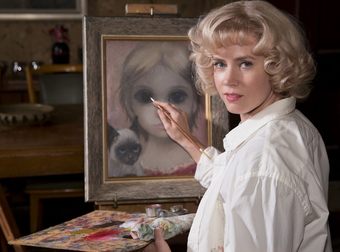
This Burton directed biographical portrait of artist Margaret Keane, whose husband took credit for her artworks for ten years (if not his entire life) was a pleasant surprise. Not only did it tell a fascinating true story well it did it with the ingenuity and humour of Burton's earlier films. Go and watch Ed Wood. The same sympathetic but observant eye is applied here. Other Burton enthusiasts will pick up in a few other of the directors signature touches.
Amy Adams herself looks like the big eyed waifs she is secretly painting. Her depiction of Margret is heartfelt and the balance between her role as mother and artist being intertwined explains the complicated nature of Keane's identity and passions.
More than once she explains giving up her claim to paintings is like giving up a child. They are part of her. On the other hand in order to keep producing these pieces for her husband, who is successfully selling them to the masses, she jeopardises her close relationship with her daughter, shutting her out of her studio when once she was the sole focus of her works. Motherhood meant her daughter was all she knew but her artwork is a more expressive and satisfying form of creation. Past its pretty and pleasing exterior Big Eyes makes you bigger picture to this story.
| Walter Keane's success and hand in creating a hype around the sugar sweet, forlorn yet Marmite like paintings (the public love them, the critics don't think they are art) is shown in all its glory while Margaret's lack of confidence muddled with deep down buried determination is clear. | this female voice was all too often sidelined, dismissed and in Margaret's case, underused. |
The film has a certificate of 12A for the use of some strong language, actually one usage in the entire film. This happens when DeeAnn has a fight with Walter when she's getting to close to the truth about the paintings. She yells "Fuck you!" from her convertible car as speeds out the drive of the Keane's very expensive family home.
Exactly the right kind of attitude to have with a man and a society that tries to claim that a women's achievements aren't equal to those of a man. Margaret proves Walter wrong in the end and no matter what you think of her paintings, the woman and this film are a success.
Squeamish Nicola


 RSS Feed
RSS Feed
